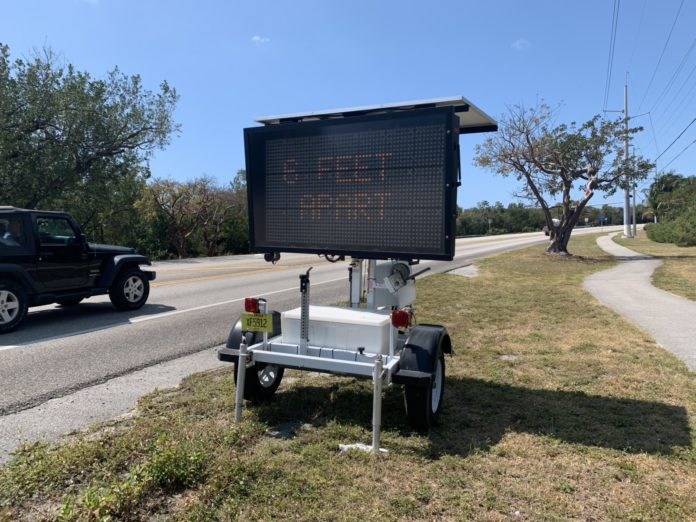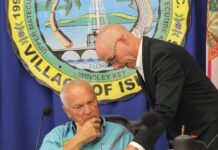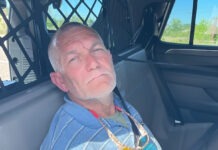
Monroe County and municipalities continue to sift through Gov. Ron DeSantis’ executive order, which urges residents to stay home and limit their activities to only essential business and activities.
Known as the “Safer At Home” order, it was first implemented in the four southeastern counties of Florida — Palm Beach, Broward, Miami-Dade and Monroe — following a March 30 press conference among mayors and state officials. On April 1, the governor ordered it go statewide effective Friday, April 3, in a bid to contain community-spread coronavirus.
The message differs from a “shelter in place” order. Per the ‘Safer at Home’ policy, senior citizens and individuals with a significant, underlying condition, such as asthma and heart conditions, should “stay at home and take all measures to limit the risk of exposure to COVID-19.”
In concert with the president’s efforts, and based on guidance by Florida Surgeon General Dr. Scott Rivkees, the order also states that residents should limit their movements and personal interactions outside of their home to only those necessary to obtain or provide essential services or activities.
Essential services stated in the order follows a list put forth by the U.S. Department of Homeland Security’s Cybersecurity and Infrastructure Security Agency’s guidelines. The order also includes directives in an executive order by Miami-Dade County recently.
Per the Miami-Dade directive and CISA, essential workforce to note include healthcare providers; grocery store workers and farmers; businesses providing food and shelter; media; gas stations; banks and financial institutions; hardware stores; contractors and appliance repair personnel; sanitation workers and exterminators; mailing services, laundromats and dry cleaners; restaurants and other facilities that prepare food, but for takeout and delivery only; pet stores; businesses supplying office products; child care facilities and landscape and pool business, among others. (for the full list, visit cisa.gov or miamidade.gov.)
The Miami-Dade order does not limit the number of persons who may be physically present performing services at any location where an essential business is conducted, but it does urge social distancing and limiting groups to less than 10. An order issued April 2 by Miami-Dade, however, directs commercial and retail establishments that provide unpackaged food for consumption to limit capacity and monitor entrances and exits where food is sold.
As of now, Monroe County is operating under the Miami-Dade directives and CISA identifications. County spokeswoman Kristen Livengood said the county attorney’s office is still reviewing the directives.
Monroe County Mayor Heather Carruthers told county officials Friday morning that there was some confusion surrounding the order that needed clarification.
“The attorneys are trying to figure out where we are and whether we need to tighten it up,” she said. “They’ll be working on that today.”
Essential activities under DeSantis’ order include recreational activities such as biking or walking, taking care of pets, caring for a loved one or friend or attending religious services in churches. DeSantis, during an April 2 press conference, tried to clarify his order with questions swirling over whether people could leave their house.
“People will say ‘can I go fly a kite? Can I do this?’ The way to think about it is when you limit people to essential activities, the goal is to reduce contacts of people outside the home,” DeSantis said. “It’s less important what you do than how you do it. If you want to go for a 10- mile run and come back, more power to you. But you wouldn’t be able to do a 20-person road race with friends.”
“You have a hoop in your driveway. You can go shoot all day, but you won’t be able to play a 5-on-5 contact game,” he continued. “You can go fishing, but you won’t be able to get 25 people on a boat and go fishing. If you’re engaged in an activity that doesn’t involve close contact, you’re going to be fine.”
Statewide, DeSantis has taken measures to limit the number of people fleeing hot spots in the country, namely the Tri-State area of New York, New Jersey and Connecticut, as well as Louisiana. Those flying from or driving into Florida from those states are required to self-isolate for 14 days.
A total of 9,585 positive cases of COVID-19 have been reported in Florida as of Friday morning. Of those, 9,248 are residents.

























